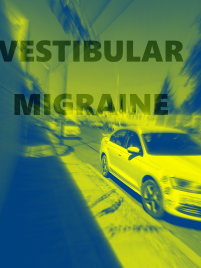Vestibular Migraine: What’s New
Dizzy? Maybe have some migraine symptoms? It could be vestibular migraine.
We’ve been talking about vestibular migraine here for almost 10 years. Back then it was not even recognized by the International Headache Society as a distinct type of migraine. So we talked about it as a manifestation of various types of migraine. In fact, dizziness/vertigo are very common migraine symptoms.
 Because, after all dizziness and vertigo (yes, I know the two are different) are seen in more than just one type of migraine. But today vestibular migraine is much more recognized as a distinct type of migraine.
Because, after all dizziness and vertigo (yes, I know the two are different) are seen in more than just one type of migraine. But today vestibular migraine is much more recognized as a distinct type of migraine.
So what is it, and how are people diagnosed?
First, you need to have a past history of some type of migraine. Second, some of your attacks (at least 50%, say the official guidelines) should include at least one common migraine symptom: sensitivity to light or sound, visual aura, and/or a significant headache, usually one sided and throbbing.
Finally, the vertigo/dizziness. It will be significant enough to interfere with your normal activities. It will last between 5 minutes and 72 hours.
You can probably already see some reasons why there is still so much confusion. If some other types of migraine also may include dizziness (such as migraine with brainstem aura) – not to mention other conditions – and if you already have migraine, and you have these symptoms sometimes, but not all the time – well, it can be a challenge to diagnose.
Even if the vertigo/dizziness accompanies your migraine attacks, your doctor should check carefully for other conditions that may be the underlying cause. And, of course, if you do have a history of migraine, and/or are experiencing any of the symptoms above, your doctor should know that as well. It’s easy to misdiagnose vestibular migraine as something else.
The current research into migraine and dizziness is being put to good use. Take for example recent studies into vertigo in children. It has been discovered that many children with vertigo actually have migraine, and that when the migraine is properly treated the vertigo is also treated. The same, of course, would be true for adults.
And beyond migraine treatment, some patients are finding help in “vestibular rehabilitation”, specific therapy for people with vertigo/dizziness.
Another very common cause of vertigo is benign paroxysmal positional vertigo (BPPV). There is some information and resources here.
Whatever the cause, the symptoms can be very disabling, and do need to be taken seriously.
You can help your doctor come to a correct diagnosis. Take note of how long the symptoms last, and what other symptoms you’re experiencing – such as ringing in the ears, visual aura (eg flashing lights), headache, or hearing loss?
Also, try to be more specific than just “I feel dizzy”. Does the room seem to be spinning? Do you feel like you are moving? Does moving make it worse?
And, as always, make sure your doctor knows your medical/family medical history.
It’s encouraging to see a renewed interest in research of vestibular migraine. However, it is a very difficult condition to study, and we still know very little about it. The good news is that many patients are finally getting an accurate diagnosis, and are finding migraine treatment that works.
